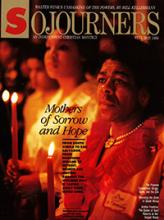The recent triumph of Washington Redskins quarterback Doug Williams, the first black quarterback to win the Super Bowl, points out once again the central role of sports as the forging ground of America's racial myths and symbols. For decades, black colleges, such as Williams' alma mater of Grambling, have sent their brightest hopes off to the NFL with the hope of seeing one of them finally become the black Unitas, Namath, or Bradshaw. And for decades they've seen their field captains automatically converted into defensive backs and wide receivers.
Read the Full Article

Already a subscriber? Login
